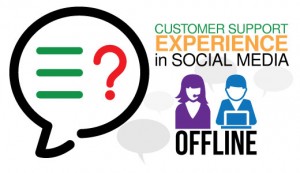Content marketing can be an extremely effective, although time-consuming, method of attracting potential customers to your brand’s site. It can be a very experimental and trial-and-improve way of working towards improving your companies reach and reputation but there are definitely some things you should not do when creating content to share on the web.

No goals
Every marketing tactic you have should have a clearly defined goal behind it. Otherwise, how can you if it’s working? And ‘increase sales’ doesn’t count. Of course, almost everything we do in marketing is to deliver a more favourable number on the bottom line in the long run but you need to understand what your marketing, in this case content marketing, is trying to achieve in order to reach that goal.
Content marketing is all about delivering a product to a consumer – so what is your product? Are you going to educate, entertain and amuse your customers or do something completely different.
Once you’ve attracted a reader, viewer or listener to consume your content you have to encourage them to take a next step. It would be silly to simply provide a great piece of content on your site and then have that hard-earned website visitor leave the site with you having nothing to show for it. You need a call-to-action – a message or request to have them sign up to your email list, to follow you on Twitter, to subscribe to your YouTube channel, or whatever your goal is.
Once you’ve been able to draw a good amount of visitors to your site through this method, you’ll be able to delve into your analytics in order to understand if this desired path is delivering results. If it isn’t, you’ll have to analyse why it isn’t and re-aim your call-to-action or maybe your content isn’t engaging people enough to tempt them to make that connection with you further than the first paragraph.
Constantly Selling
Good content marketing works because people don’t want to be sold to anymore. We’re inundated, nowadays, with aggressive advertising in every part of our lives – billboards on the side of the road, interrupting our favourite TV show, before the movie we paid to see at the cinema, and more and more on the social networks we use. People don’t want to be advertised at, they want to learn, they want to be entertained, they want to be challenged.
If you focus on selling your products it will instantly turn people off. The key is to deliver value in your content in order to build a relationship with potential and existing customers alike. By building a relationship and a bond of trust between consumer and brand, they’ll be more likely to invest in your products or services. Give the people what they want.
Quantity Over Quality
An easy mistake to make when you begin a content marketing approach for your business is to look at the content giants and say ‘we need to do that’. This often leads to the belief that you need to output a dozen articles a day in order to compete with the likes of Mashable or BuzzFeed . If you try this, one thing is inevitable – poor quality content.
Mashable are a content company and they employ huge numbers of people to only output content. More than likely, you’re a business that doesn’t ‘sell’ content and it won’t make sense to invest in an army of journalists and bloggers. Therefore, it’s not going to be possible for you to be pushing boatloads of content out onto the web and be able to maintain quality.
Quality is the most important thing when it comes to content. Each time you draw a first-time visitor onto your site though a link to your blog, you need to impress them in order to keep them on your site, to have them return and to start building trust between that reader and your brand. If your content is rubbish, they probably won’t read on passed the first couple of paragraphs before leaving your site. No amount of content elsewhere on your site is going to make up for that disappointing experience when they first make contact with your brand.
Anti-Social Behaviour

Social media walks hand-in-hand with content marketing. It is the most visible place for your readership to share your content as well as to continue the discussion your article, video or podcast started.
The key to social media is in the name – ‘social’. In real life, people don’t enjoy talking to others if they don’t respond. The same is true online. In order to make the most of your content, you need to continue the relationship building attitude on Facebook, Twitter, YouTube, Google+, and all the rest.
Expect A Quick Fix
Content marketing isn’t a get-rich-quick scheme. Just as a human relationship takes time to grow and that bond takes time to cement, the same is true of creating an association between your brand and your customers. This is a long-haul tactic – never think otherwise.
With that being established, consistency is essential. The positive reputation you’re trying to develop with content requires you to deliver it on a regular basis. If you don’t, you’re not going to retain your customer’s attention for very long and there will be no reason for them to return to your site.
Stop Most people that start blogs stop blogging and this is the worst possible thing you can do. You may not get high stats, especially at first, but that is not a reason to stop. You can change your content’s focus, you can change your social media strategy, you can improve your SEO approach, but you can’t stop producing content. Why will new consumers, who’ve never heard of your business, come to your site otherwise? If you aren’t sharing valuable content online then you’re reducing your chances of being found organically, and this is the best way to be found. You’ll begin to lose that presence in your customers’ lives each time they log on to Facebook, see what new videos there are from their YouTube subscriptions or check their RSS feeds – you become irrelevant.
Business Articles | Business 2 Community
(285)








